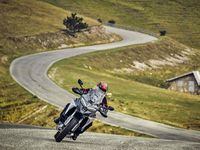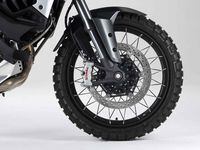Not so long ago, Ducati’s marquee machines were powered by V-twin powerplants. But engine advancements in MotoGP trickled down to consumers in the form of a powerful new V-4 platform, first arriving in the Panigale, then in the Streetfighter. Now it’s adventure riders' turn to have a crack at the mill in the all-new 2021 Multistrada V4, V4 S, and V4 S Sport.
We’ve already covered the innovative front and rear radar technology equipped on the Multistrada V4, which in and of itself would warrant the Multi a place at the table of Bikes We’re Most Excited to Ride in 2021 (article forthcoming). But its V-4 Granturismo engine takes the bike to a whole new level; a MotoGP-derived platform that’s expertly tuned to meet the various needs of adventure-touring riders around the globe. A completely new powerplant in one of Ducati’s most popular model lines definitely piques interest.
Ducati has seen the Multistrada platform as a platform for innovation since its birth in 2003. The initial model was a more road-focused, leggy sportbike than today’s iteration, but still had the ability to tackle long miles and even handle some off-roading. Ducati introduced the world to ride modes on its second-gen model in 2010, making it an even more capable motorcycle in different riding conditions, while the third-gen in 2015 got an engine with variable timing. In the years since its release, it has carried countless travelers comfortably to distant locales and even scored wins at Pikes Peak in the able hands of the late Carlin Dunne.
And with the V-4 era now upon us, it seems the Multistrada platform will continue to be a leader in the segment for years to come.
As noted above, there will be three iterations of the Multistrada V4, but all will share the same 1,158cc, 90-degree, V-4 engine. It’ll yield a claimed 167 hp at 10,500 rpm and a little over 92 pound-feet of torque at 8,750 rpm in stock trim. It shares a similar architecture with the Desmosedici Stradale V-4 used in the Panigale and Streetfighter, but some targeted refinements have been implemented to make this much more amenable to touring riders.
For example, camshaft profiles and valve lift speeds have been changed, and its fuel-injection system features smaller-diameter throttle bodies and longer ducts. Engineers aimed to provide not only an instant, smooth, and progressive throttle response across the rev range by way of these changes and calibration with the ride-by-wire system, but to also improve the mechanical function of the engine over time. Ducati is promising a 37,282-mile (60,000 kilometers) valve maintenance and spark plug replacement interval with the new engine. A boon to riders who plan to log lots of miles on the machine.
Another welcome feature is the counter-rotating crankshaft (another MotoGP-derived element), which runs opposite to the direction of the wheels to help improve handling and agility by reducing the gyroscopic effect. On the road, this should make for a lighter-handling bike overall.
As you’d expect, rods and pistons are updated for the Granturismo layout as well.
And though it’s grown by two cylinders, the Multistrada will also retain the aural quality of a V-twin. That was also the promise with the Panigale at its release, and we were able to report that Ducati isn’t blowing smoke. The 90-degree layout with “twin-pulse” firing order (where the left cylinders fire at nearly the same moment, and the righty cylinders fire at nearly the same moment) and 70-degree offset crankpins provide the sweet sound so many Ducatisti have come to know and love. It also contributes to better torque, which is always nice.
Semi-dry sump lubrication is taken from the Stradale as well, and the sump itself is positioned high in the engine configuration to improve ground clearance.
Riders will appreciate the fact that they won’t get too toasty when the bike’s at a stop because the rear cylinders of the engine are deactivated when the motorcycle isn’t moving. This also helps to improve overall fuel consumption.
The six-speed gearbox and slipper clutch have been calibrated to specifically suit the needs of the platform. This means a shorter first gear than the gearbox on the Stradale, allowing for better uphill starts and low-speed power delivery. It’s outfitted with a rotary gear sensor that optimizes the function of the Ducati Quick Shift System (standard on S and S Sport and an upgrade option on the standard).
And with all of these changes, engineers were able to reduce the weight of the engine overall when compared to the previous Testastretta V-twin. It’s a little more than 2.5 pounds lighter than the outgoing mill.
The new engine is housed in an aluminum monocoque frame. The base Multi will have Marzocchi suspension components with 6.7 inches travel front and 7.1 inches travel at the rear. Suspension components are upgraded on the S and S Sport, each coming with semi-active Marzocchi Ducati Skyhook suspension setups. They’ll come with 19-inch front and 17-inch rear wheels shod in Pirelli Scorpion Trail II tires. Brembo braking components will be complemented by Bosch-Brembo 10.3 ME Cornering ABS.
Ducati has also slightly revised the geometry of the bike, shortening the wheelbase slightly and redesigning the cockpit. Riders will be in a bit more of an aggressive ride position compared to previous models, and the center of the bike has narrowed slightly to make off-road riding and standing on the pegs a bit easier. In that vein, the seat is also a bit narrower and lower than the previous model.
Wind tunnel testing resulted in a revised Perspex screen that deflects oncoming air more effectively. It’s height adjustable and has deflectors on either side. The beak and air vents at the front are also refined to optimize aerodynamic efficiency.
The 5-inch TFT display on the base model has all the standard information you’ll need along with ride mode settings, wheelie control, and traction control settings. The S and S Sport models also come equipped with power modes, Ducati Quick Shift, cruise control, daytime running lights, cornering lights, Ducati Connect with full-map navigation system, a full LED headlight, and vehicle hill hold control. These upgraded models will have a 6.5-inch TFT instrument display as well.
All versions will come with the aforementioned front and rear radar system.
A few choice upgrades will be standard on the S Sport, including an Akrapovič carbon fiber and titanium exhaust as well as a carbon fiber front mudguard.
The base-model Multistrada V4 will start at $19,995. The S model will run you $24,095 while the S Sport prices at $26,095. The two upscale options will have different trims available as well, which include things like luggage heated grips and seats, and crash protection.






















/cloudfront-us-east-1.images.arcpublishing.com/octane/ITNLTIU5QZARHO733XP4EBTNVE.jpg)
/cloudfront-us-east-1.images.arcpublishing.com/octane/VZZXJQ6U3FESFPZCBVXKFSUG4A.jpg)
/cloudfront-us-east-1.images.arcpublishing.com/octane/QCZEPHQAMRHZPLHTDJBIJVWL3M.jpg)
/cloudfront-us-east-1.images.arcpublishing.com/octane/HXOUJXQWA5HBHGRO3EMJIGFMVI.jpg)

/cloudfront-us-east-1.images.arcpublishing.com/octane/3TIWWRV4JBBOLDVGRYECVVTA7Y.jpg)
/cloudfront-us-east-1.images.arcpublishing.com/octane/KIX5O23D5NAIBGFXBN3327DKZU.jpg)
/cloudfront-us-east-1.images.arcpublishing.com/octane/7GJYDUIPXRGMTMQKN6ONYOLBOU.jpg)
/cloudfront-us-east-1.images.arcpublishing.com/octane/MUQLOVLL2ZDGFH25ILABNBXKTI.jpg)
/cloudfront-us-east-1.images.arcpublishing.com/octane/TNOU5DNE2BC57MFPMGN2EIDXAM.jpg)
/cloudfront-us-east-1.images.arcpublishing.com/octane/GTCXACQGJ5HAPDTGWUQKDEH44E.jpg)
/cloudfront-us-east-1.images.arcpublishing.com/octane/S35YGSEMEZB4BLTDJTSZPF4GLA.jpg)
/cloudfront-us-east-1.images.arcpublishing.com/octane/5UOT6HPX2JFMRJAX6EH45AR4MQ.jpg)
/cloudfront-us-east-1.images.arcpublishing.com/octane/OKWOJWAKP5EP3OACCRRWPCIX2Q.jpg)
/cloudfront-us-east-1.images.arcpublishing.com/octane/2WF3SCE3NFBQXLDNJM7KMXA45E.jpg)
/cloudfront-us-east-1.images.arcpublishing.com/octane/G4MG6OUCJNBSHIS2MVVOTPX65E.jpg)
/cloudfront-us-east-1.images.arcpublishing.com/octane/IIGGWFOTOJGB7DB6DGBXCCMTDY.jpg)
/cloudfront-us-east-1.images.arcpublishing.com/octane/QSTCM6AVEZA5JJBUXNIQ3DSOF4.jpg)
/cloudfront-us-east-1.images.arcpublishing.com/octane/U4I7G625B5DMLF2DVIJDFZVV6M.jpg)
/cloudfront-us-east-1.images.arcpublishing.com/octane/B6XD6LS6IVCQPIU6HXDJSM3FHY.jpg)
/cloudfront-us-east-1.images.arcpublishing.com/octane/ICL63FEDDRDTTMINYICCEYGMDA.jpg)
/cloudfront-us-east-1.images.arcpublishing.com/octane/FCGZHQXRBZFLBAPC5SDIQLVF4I.jpg)
/cloudfront-us-east-1.images.arcpublishing.com/octane/WNOB6LDOIFFHJKPSVIWDYUGOPM.jpg)
